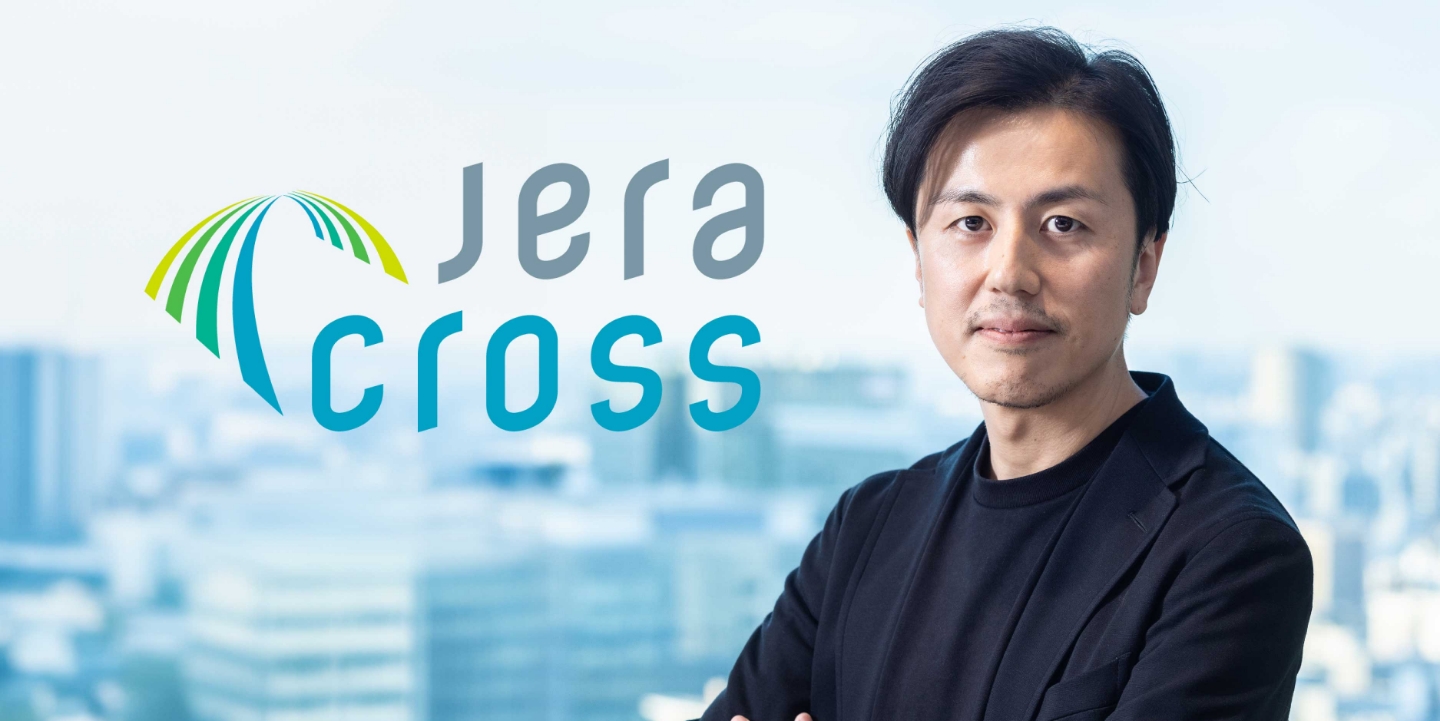
JERA Cross Launched to Accelerate Corporate Green Transformation (GX)
13 June 2024
In May 2024, JERA announced the establishment of JERA Cross to promote corporate decarbonization efforts and further the social adoption of carbon-free electricity. JERA Cross strives to reframe corporate decarbonization efforts from being perceived as costs to being recognized as their value. McKinsey and Company, one of the world’s “big three” strategic consulting firms, has cooperated in this project. Together, we will provide companies that are struggling to balance decarbonization and business growth with “green transformation” (GX) solutions that promote end-to-end decarbonization from implementing the energy transition to transforming corporate sustainability. This leverages McKinsey’s expertise in building green businesses and extensive track record in corporate transformation.
We spoke with Mr. Kengo Ichikura, director, executive officer, and CPO (Chief Product Officer) of JERA Cross, about the new company’s vision and business and about his commitment to “co-creation” as the key to the success of GX.
INDEX
- JERA Cross Provides GX Solutions for Businesses
- Accelerate Corporate Decarbonization and Business Growth
- Two Approaches Based on the Needs of Companies Concerned about GX
- Introducing New Tracking Technology as a Key to GX Success
- Our Goal is to Cultivate a Fair Market through Co-Creation with Customers, Going beyond Our Own Profit
JERA Cross Provides GX Solutions for Businesses
The move toward decarbonization is accelerating worldwide. The Japanese government has drawn up a Green Growth Strategy for achieving carbon neutrality, so many companies have an urgent need to pursue corporate GX. Ichikura, who has been working on corporate GX since before JERA Cross was established, observed:
Although most companies have set decarbonization goals, difficulty in seeing the future return on their investment costs prevents them from taking the next step. In addition, the rules regarding energy procurement are difficult and cannot be solved by the person in charge alone.
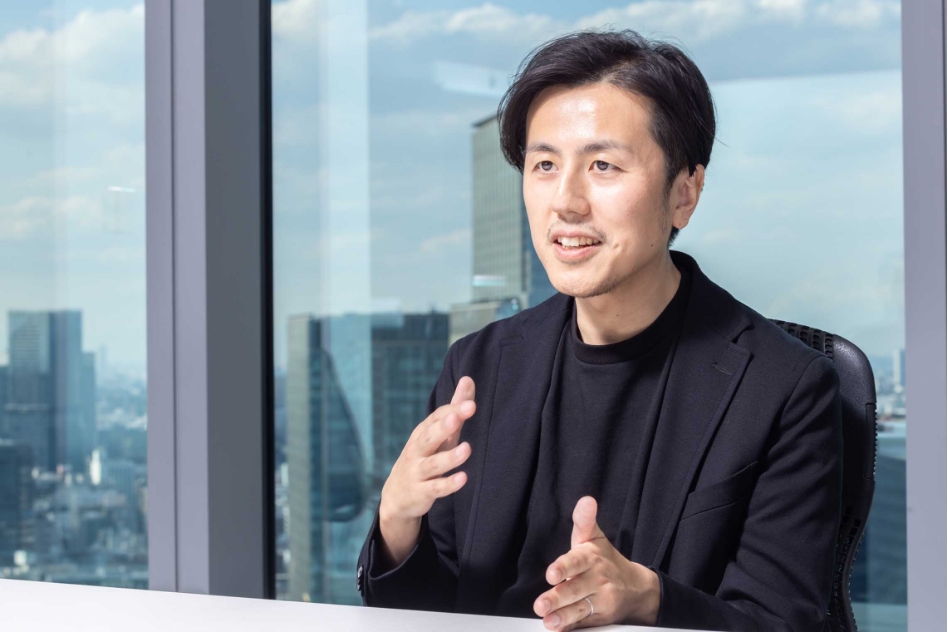
Japanese companies are now tied down with decarbonization issues. The employees I have faced in departments tasked with promoting decarbonization at their companies are forced to spend their days dealing with energy-related issues unrelated to the core business activities they hoped to pursue when they joined. We want to free such employees from the burden of the pressure to reduce costs while introducing renewable energy, and that’s why JERA Cross was born.
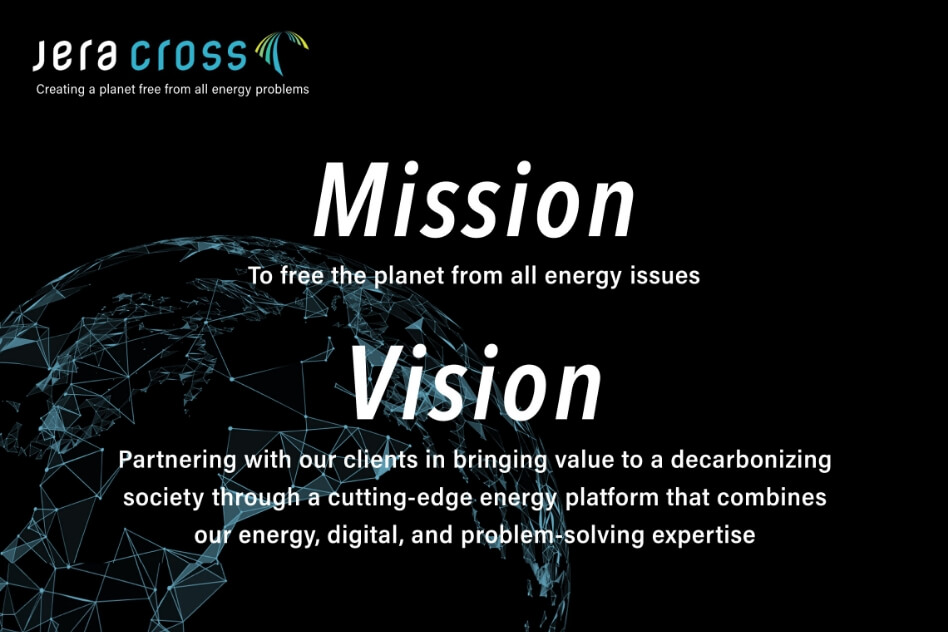
JERA Cross’s mission and vision encapsulate Ichikura’s thinking.
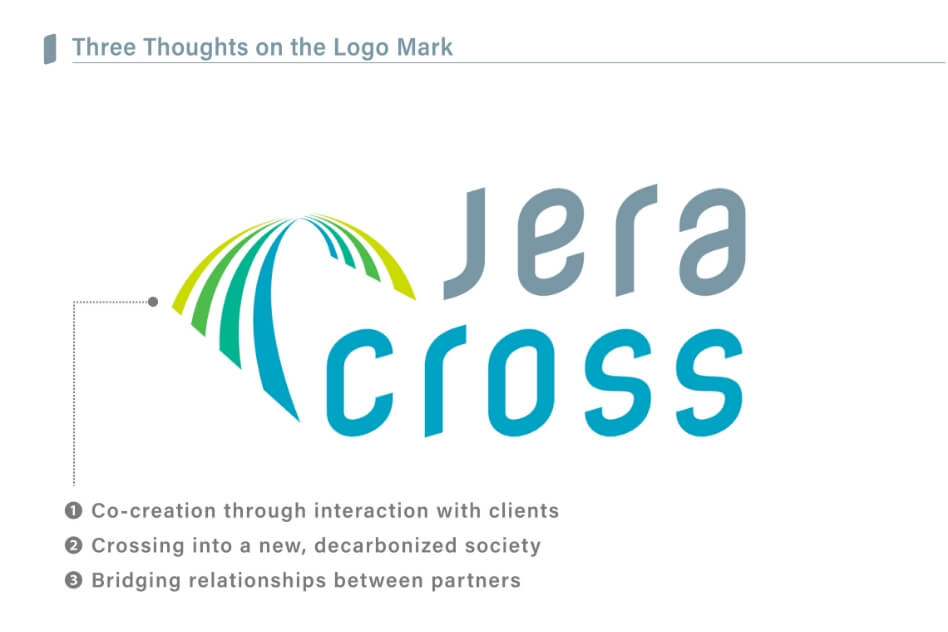
The company name JERA Cross reflects three kinds of crossings or intersections.
Accelerate Corporate Decarbonization and Business Growth
So, what is needed to “free companies from the challenges of decarbonization”? Ichikura explains using the example of the digital transformation (DX):
The digital transformation (DX) also has stages, and was initially focused on the introduction of IT systems. However, the true purpose of DX is to generate new services and value by transforming business models. The introduction of IT systems must be an economically rational investment based on the expectation of future returns. On this point, such returns are harder to see with GX than with DX. Therefore, while there is first-order meaning for JERA Cross to sign power purchase agreements directly with companies to deliver green electricity to them, this would only serve to reduce CO2 emissions. Like simply introducing IT systems in a DX context, that wouldn’t leave room for going beyond. This is why we need to work with companies to envision the future of their business and to provide support in terms of both energy and their business that advances their step-by-step transformation.
Ichikura’s vision is to get involved in transforming the business models of companies that consume energy and with them to co-create new value through GX. The idea is to create a situation where “the more the business grows, the more CO2 emissions decrease.” To that end, he says, McKinsey’s expertise and track record in business building and transformation have been essential.
JERA knew a lot about energy, but it lacked the ability to transform businesses 5 years or 10 years down the road. This ability is essential for achieving transformation through GX, and McKinsey’s know-how in achieving and supporting transformation at many companies is a great asset. This initiative was made possible because McKinsey recognized the social significance of our vision.
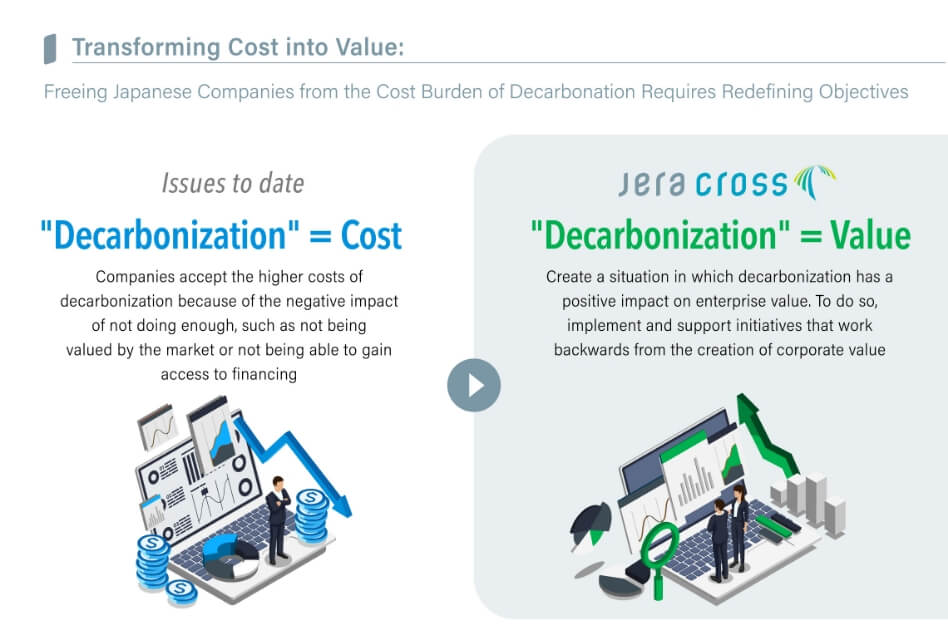
New decarbonization solutions that leverage the know-how of global consulting firm McKinsey and combine the energy knowledge and digital technologies of JERA, with its global energy value chain, will help companies achieve both decarbonization and business growth.
Two Approaches Based on the Needs of Companies Concerned about GX
The challenges companies face with GX differ by industry. In the steel industry, for example, the shift to “green iron,” which emits zero CO2 during the manufacturing process, may require huge capital investment and force changes to the business model itself, while in other cases such reductions may be attainable under the existing business model.
To respond to such diverse needs, JERA Cross, in handling everything GX from upstream to downstream—that is, from energy procurement and CO2 reduction through consulting on products and services created from that energy—offers two approaches.
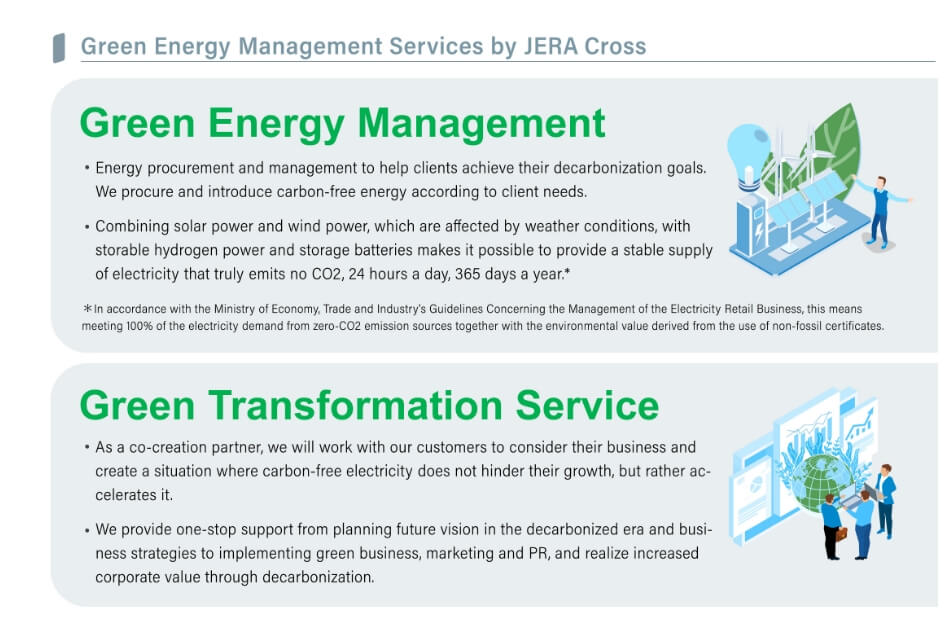
The first approach for many companies will be green energy management services. If clients just want us to help them to reduce CO2 emissions by a certain amount by a given target year, JERA Cross will handle everything from planning to execution. This energy management menu includes “24/7 carbon-free electricity,” which emits no CO2 24 hours a day, 365 days a year, and which we previously co-created with Toho and Yamanashi Prefecture.
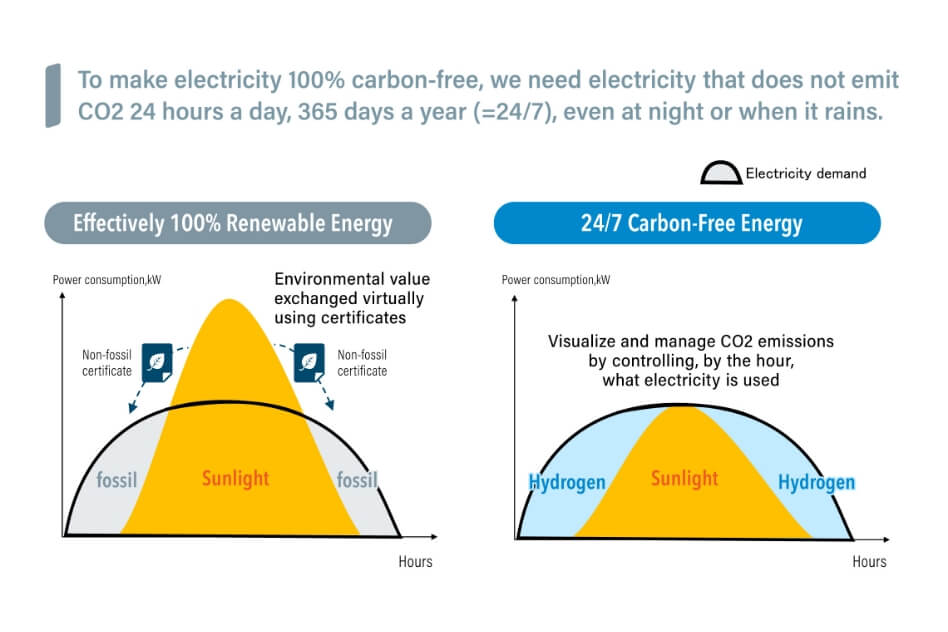
“24/7 carbon-free electricity”* is being promoted by the United Nations through its establishment of the international initiative “24/7 Carbon-Free Energy Compact.”
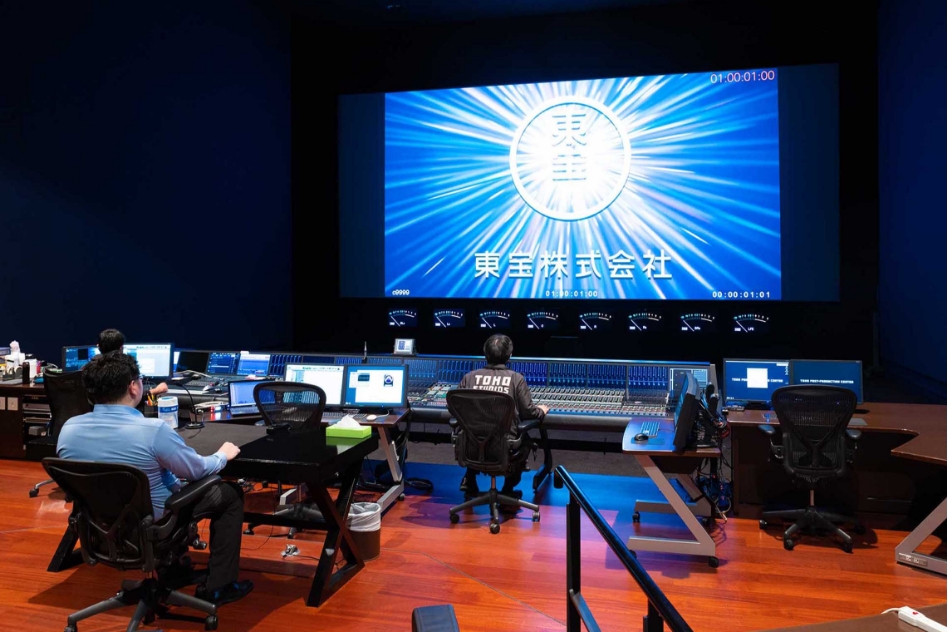
Aiming to eliminate CO2 emissions from the entertainment business of movie production, we are working with Toho to introduce Japan’s first 24/7 carbon-free electricity.
Related Articles:JERA and Toho: A Cross-Industry Collaboration Aiming for “Zero CO2 Emission Movies”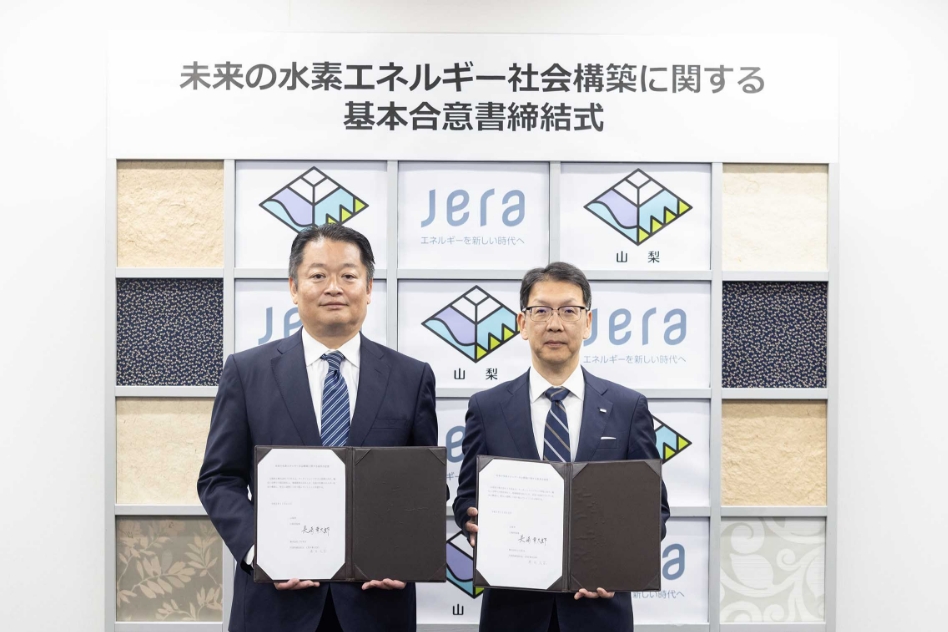
Working in collaboration with Yamanashi Prefecture, we are utilizing 24/7 carbon-free electricity and green hydrogen to build a carbon-free regional community.
Related Articles:Yamanashi Prefecture and JERA Promote Regional Hydrogen Utilization for a Carbon-Free Future!In the area of green energy management, the first goal is to reduce CO2 emissions through renewable energy. But why are we pushing decarbonization in the first place? Ichikura notes that many companies struggle to come up with a good answer to such a fundamental question.
When we conduct hearings with various companies, we often find that the purpose of decarbonization for the entire business is fuzzy. Even if CO2 reduction is achieved, if the value of doing so is not reflected in the company’s products or services, it just become a cost. As a result, it becomes necessary to put a vision of the future transformed by GX into words, and to provide consulting on both decarbonization and business activities simultaneously. This is the second approach, the role of Green Transformation Services.
Introducing New Tracking Technology as a Key to GX Success
JERA Cross's strength is the field of delivering and managing energy. By combining JERA's power generation-related upstream data and digital technology with a UX (user experience) based on new electric power data utilizing McKinsey's know-how, and then integrating it with client electricity consumption data, we can find new ways of using energy.
With this type of data, we can 'tag' the energy sources our customers utilize every hour. For example, we could use 100% solar power for the hour starting from 2 p.m. or use wind power for 20% of electricity for the hour starting from 3 p.m. It becomes possible to accurately track and match what kind of energy is used, where it was produced, and how much is used.
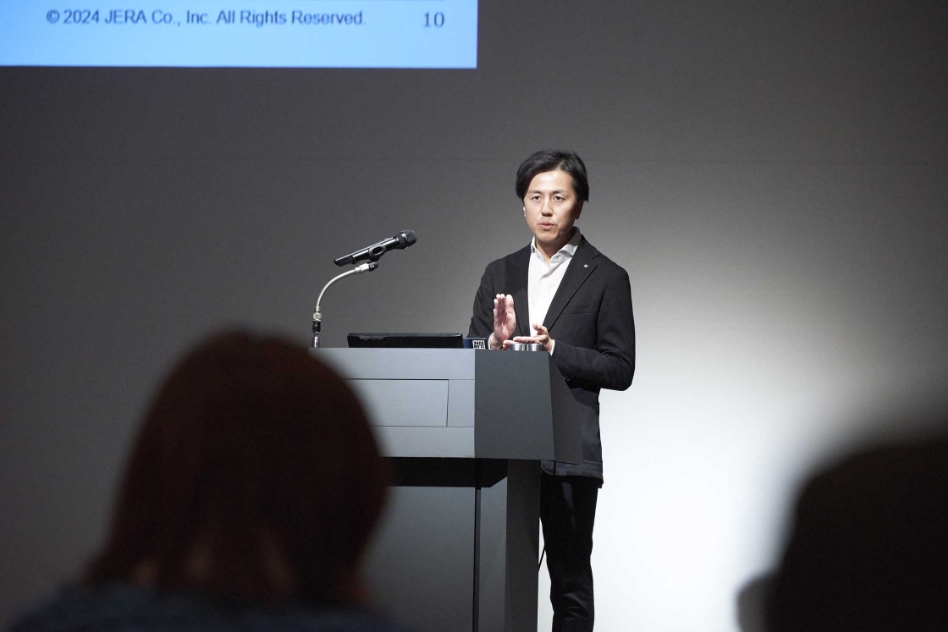
Ichikura speaks at the Nikkei SDG Forum Special Symposium in Shibuya (22 March 2024)
If this becomes a reality, it will be possible to more precisely display a product or service’s "carbon footprint" that visualizes CO2 emissions per product unit. In the future, when end users start choosing carbon-free products, such carbon footprints may change their consumption behavior, and calculation rules are already being developed in Europe.
To take advantage of this strength, it is important to have tracking technology that complies with international rules.
It is no exaggeration to say that the management and certification of electricity data generated by power source, and used to calculate CO2 emission and reduction amounts, will not only contribute to mandatory reporting by companies, but also be a key technology for trading green value. We believe that collaborating with Energy Tag, a British non-profit organization, to introduce tracking technology that quickly incorporates international certification rules will be a significant advantage for us in GX.
Our Goal is to Cultivate a Fair Market through Co-Creation with Customers, Going beyond Our Own Profit
JERA Cross envisions a future where carbon-free electricity is taken for granted as part of society. To achieve this, Ichikura believes it will be necessary to gain a market consensus regarding the value of GX.
Our goal is not to sell electricity at a high price, but to increase the number of future-oriented businesspeople and model cases such as Toho and Yamanashi Prefecture, so that the world recognizes the value of GX and carbon-free electricity. In order to free companies from the challenge of decarbonization and to bring carbon-free electricity to society, it will be critical to create an appropriate GX market. If that happens, the value of the renewable energy and zero-emissions thermal power that JERA is promoting will naturally increase, so I think our mission now is to keep moving forward.
Ichikura also values relationships of co-creation.
The "24/7 carbon-free electricity"* trying to be introduced at Toho and in Yamanashi Prefecture is, in a sense, the world's most cutting-edge—the ultimate clean energy ahead of its time. What makes it possible is that we were able to have a relationship of co-creation, where we think about the future together, rather than a client–contractor relationship. Still, rather than trying to do big things all at once, I hope to work together with clients on small things first. No concern is too small, so we I hope people will feel free to consult with us.
Although he spoke calmly throughout the interview, here Ichikura laughed and said, "Well, maybe I went too far in saying no concern is too small," but his passion was evident.
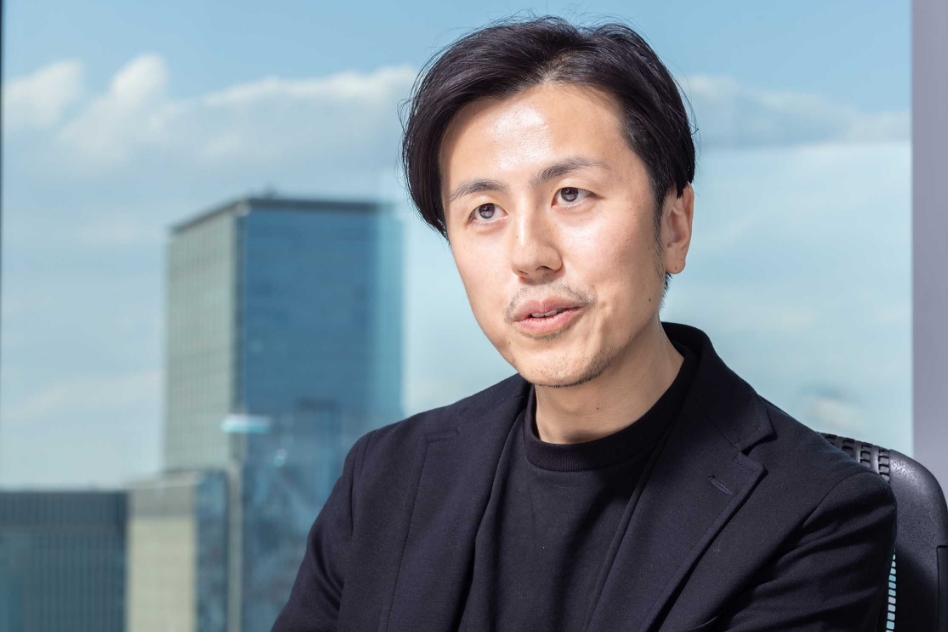
What Japanese companies need for GX is to never give up. Rolling with the punches is the only option. If you don’t give up, a breakthrough is sure to come. You just have to keep punching until you land one. It’s all about perseverance.
At time of launch, JERA Cross has about 30 members, but the company continues to assemble strong talent including AI and sales consulting professionals. Ichikura exudes confidence, saying, "We talk about how if we can’t make a breakthrough, no one else in Japan could either, and I'm proud of that." All eyes are on JERA Cross’s next moves as the frontrunner pioneering GX in Japan.
* In accordance with the Ministry of Economy, Trade and Industry's Guidelines Concerning the Management of the Electricity Retail Business, this means meeting 100% of the electricity demand from zero-CO2 emission sources together with the environmental value derived from the use of non-fossil certificates.
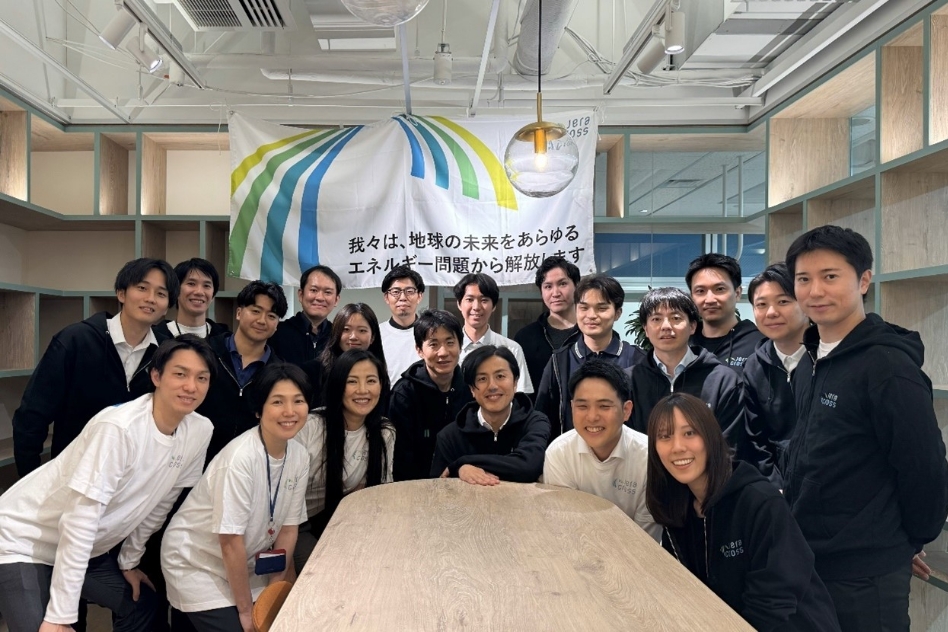

Kengo ICHIKURA
Director, Executive Officer, and CPO (Chief Product Officer) of JERA Cross Co., Ltd.
Joined Tokyo Electric Power Company in 2006 and was involved in the thermal power generation business in Japan and abroad. After building digital strategies and promoting DX projects at JERA from 2018, he became involved in the Digital Power Plant project and digital platform strategy as General Manager of the Digital Transformation Section. From 2023 he promoted the launch of new businesses as Senior Supervisor of the Solution Service Division. In June 2024, he was appointed Director, Executive Officer, and CPO of JERA Cross Inc.
RELATED STORIES
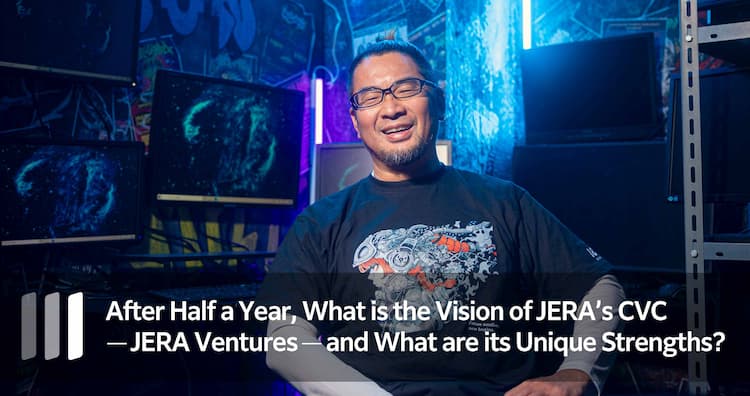
After Half a Year, What is the Vision of JERA’s CVC —JERA Ventures—and What are its Unique Strengths?

Yamanashi Prefecture and JERA Promote Regional Hydrogen Utilization for a Carbon-Free Future!
Amidst global changes in the energy landscape, hydrogen has garnered attention as a clean energy source,…

DPP = A Digital Power Plant that adds power of on-site onto AI
JERA held a press briefing on "Digital Power Plant (DPP)" on October 10, 2023.


